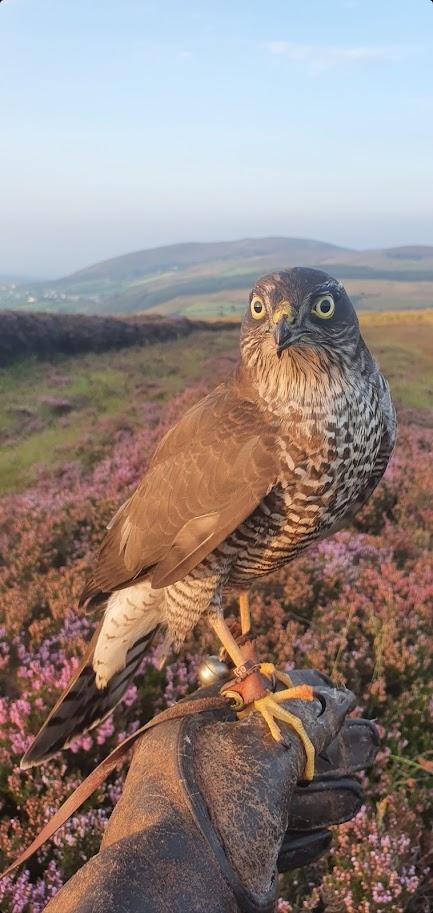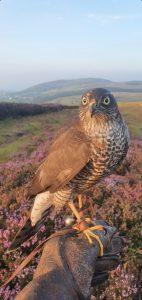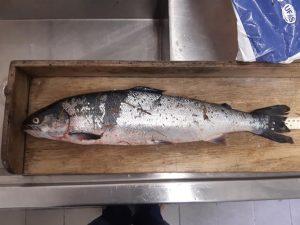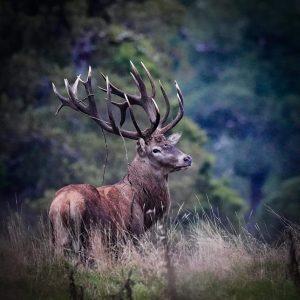Irish Extra October 2021

With Game shooting opening in September, we all look forward to getting out for a shot. The Teal in our area where in the usual spots on opening day which is never usually the case as they normally arrive a little later. This year my focus was on a September bag but rather than with the Gun it was with a little female Sparrowhawk called “Penny” that I look forward to flying over the winter. I acquired Penny at only a few weeks old from my friend and Falconer, Pedro Soltani back in late July and had spent the remainder of the summer training her which was not an easy task! As the season opened “Penny” was ready for some hunting and we took advantage of the longer and warmer evenings to get her (and me) a little fitter and along with my daughter acting as beater we had some great fun as Penny pursued and caught her first quarry among the rushy boglands above our house. Training and flying a Sparrowhawk has always been on my list and my only regret was I didn’t do it sooner. It wasn’t easy, however, the task was made much easier with the expert advice I received from local Falconer, Martin Maloney who has spent a life time with birds of prey and especially Sparrowhawks and grew up training and flying them under the expert eye of his father who was also a falconer. Martin must have been quite sick of me calling him with questions during August and September, and I am very appreciative of him as having literally decades of experience on the end of the phone is absolutely priceless. Previously I trained and flew a Harris Hawk, but a Sparrowhawk has always been on my mind and when the chance came up I couldn’t miss it, there really is something special about flying a native bird in its native land at native quarry.

Pet travel updates
DAERA Minister Edwin Poots MLA has instructed his officials to indefinitely allow all pet dogs, cats and ferrets to travel from Great Britain (GB) to Northern Ireland (NI) without checks while negotiations between the UK government (UKG) and European Union (EU) continue. The move comes after the Minister spoke to Secretary of State for Environment, Food and Rural Affairs George Eustice, raising a number of issues he remains concerned about, including pet travel. It also follows last week’s statement by Lord Frost to extend the overall grace periods for GB to NI trade indefinitely. Minister Poots said:
“While negotiations continue between the UKG and EU to find solutions to the currently unworkable Protocol, I am not prepared to let people travelling with pets between GB and NI deal with the ongoing uncertainty around checks and whether or not they need to vaccinate their animal for diseases that are all but eradicated here.
“I want to give much needed clarity and therefore, I have instructed my officials to indefinitely allow all pet dogs, cats and ferrets travelling from GB to NI without checks, until the negotiations are successfully concluded.
“The checking requirements I have paused are not necessary, particularly given that the last case of rabies on these islands was in 1922. I have also been particularly concerned about the impact these measures may have on travellers with assistance pets.”

Salmon Concern
Inland Fisheries Ireland, the state agency responsSalmon Concernible for the protection and conservation of freshwater fish and habitats, is investigating farmed salmon recovered from the Connemara Fishery.
Officers from the Western River Basin District in Galway were alerted by anglers fishing for wild Atlantic salmon on the Dawros River in Letterfrack, more commonly known as the Kylemore River locally. The anglers had captured fish with poorly formed fins and other distinguishing features that are associated with farmed salmon.
Scientists from Inland Fisheries Ireland inspected various fish samples from the river and have confirmed that the fish are of ‘aquaculture origin’ and are not wild Atlantic salmon.
The discovery is a serious cause for concern for Inland Fisheries Ireland, according to its Head of Operations, Dr Greg Forde. He said: “The Dawros Rivers have been designated a special area for conservation for wild Atlantic salmon and we are seriously concerned about the impact that farmed salmon could have on this native species. For example, farmed salmon could potentially transfer disease or could interbreed with the indigenous wild salmon population of this river. Salmon spawn during the month of December and each river has a genetically unique salmon stock. Early indications are that the farmed salmon, due to their size and development, could be capable of spawning this winter and interbreeding with wild fish thereby weakening the natural genetic pool unique to the Dawros River.”
Inland Fisheries Ireland’s investigations are on-going to determine the source of the escape. The state agency has notified the Department of Agriculture, Food and the Marine, which is responsible for the issuing of aquaculture licences.
In an appeal to owners and operators of salmon fish farms around the country, Dr. Forde said: “To protect and conserve wild Atlantic salmon for both current and future generations, it is absolutely essential that all salmon aquaculture installations are completely secure and farmed fish are not allowed to escape into the wild.”
To report any sightings of escaped farmed fish, anglers and members of the public are encouraged to call Inland Fisheries Ireland’s confidential hotline number on 1890 34 74 24, which is open 24 hours a day.
Deer Licensing Updates

The NPWS (Ireland) Have introduced mandatory training and certification for first time applicants for deer hunting licenses. Under the Wildlife Acts, annual licences are required to hunt deer during the Open Season which is the period during which deer can be legally shot. The Open Season for deer operates generally from 1 September to 28 February of the following year, depending on the species and gender of deer. About 5,500 deer hunting licences are issued each year of which in the region of 1,000 are first time applicants. For the 2021/22 deer hunting season which starts on 1 September 2021 it will be a requirement going forward for first time applicants to have the necessary training and certification. The Department will put in place an appropriate oversight regime to ensure that the training and certification are delivered to an appropriate standard.
This announcement was debated heavily on social media, with some for the change and many against. My own personal view on the matter is that it is a positive move. I feel anyone either beginning stalking or indeed a seasoned stalker can all benefit from some degree of training and licensing requirements will not deter someone who is genuinely interested. The right to roam in the countryside with firearms is our right, but one that has to be taken seriously and I feel not something to be dished out to anyone not fully willing to understand and comply with the responsibility of it. Licensing and legislation is becoming thicker in country sports and will only continue to do so, there are aspects of it like Deer stalking I fully agree with and others such As Foreshore licenses for wildfowling I totally disagree with. I am each season, swamped with paperwork in order to continue to do what I do. Firearms license renewals for each gun, foreshore permits for wildfowling, deer stalking licenses, falconry possession permits, falconry permits, European firearms pass and then visitors permits for the UK, I have always felt that when it comes to country sports, Ireland loves licences! One only has to browse the NWPS website to see just how many small and sometimes normal things in the UK require a license in Ireland, but hey – What do I know!
Until next time…Good Hunting!